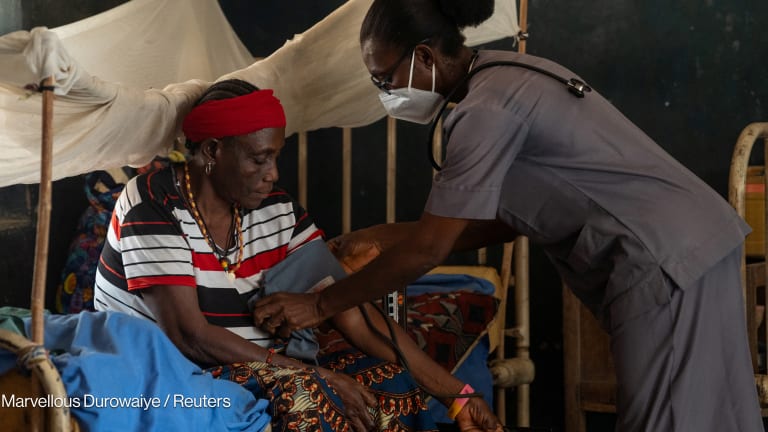
International cooperation is changing, and a new generation of leaders has set out to harness the potential of technology, innovation and partnership for social good.
In global health, one U.S.-based nonprofit has made it its mission to nurture young leaders through a series of hands-on, multidisciplinary fellowships offered in collaboration with a growing number of institutions large and small.
The Global Health Corps was founded in 2008 by six young entrepreneurs, including Barbara and Jenna Bush, the daughters of former U.S. President George W. Bush, as well as Charlie Hale and Andrew Bentley of Google and Dave Ryan and Jonny Dorsey of FACEAIDS.
GHC offers young professionals with a variety of skill sets the opportunity to work with international, national and local health groups like Clinton Health Access, Partners in Health and CARE. Fellowships are open to people aged 30 and below with at least an undergraduate degree – not necessarily in the field of medicine.
Collaboration is a key feature of these 1-year fellowships: To facilitate local solutions and information exchange, GHC usually teams up foreign fellows with fellows from the host country.
A recent batch of GHC fellows, for instance, includes four architects who, in collaboration with MASS Design Group, helped design a health center in Rwanda that has become a model for for curbing the spread of communicable diseases like tuberculosis. Two of the fellows were Rwandans and two were U.S. citizens.
“We really want to make sure that it is a global dialogue,” GHCCEO Barbara Bush told Devex. “Our thought is, if these fellows are working on global issues, it should be a global group of young leaders working together.”
But GHC does more than simply recruit and deploy fellows. It collects and shares best practices, and invests in its fellows even after their assignment ends.
“We want them to be the minister of health in their country in 10 years,” Bush said. “We want to make sure they stay connected to these issues and continue to think through how you can create best practices and use best practices that exist elsewhere in their work.”
GHC provides avenues for fellows to connect and learn from each other through seminars and retreats, like a recent one for the nonprofit’s East Africa fellows in Kigali. GHC also keeps its alumni connected with one another and with their mentors, often high-profile experts who are able to offer valuable advice on how to build on their experience as a fellow. GHC mentors include the likes of former UNAIDS Executive Director Peter Piot and former U.S. Global AIDS Coordinator Mark Dybul, for instance.
Careful growth and a focus on impact
Since its foundation, GHC has increased its network of partner organizations. The number of fellowships has risen dramatically as a result, from 22 in its first year to 90 for its upcoming class, for which applications are due Feb. 17. Next year, GHC hopes to place 140 fellows.
Although the selection of fellows is driven by its partners’ needs, GHC puts a premium on finding team players who are eager to make a lasting impact on global health long after the fellowship ends. The NGO looks for applicants with strong leadership qualities, the ability to mobilize others, and a commitment to social justice.
“We want our fellows to be flexible and very humble,” Bush said, “and realize that they are going to work on challenges that people have been working on forever, and that they’re working within organizations that already exist and they need to approach their work in a very focused manner in the community they are trying to serve.”
The most commonly requested skills lie in the areas of supply chain management and logistics, project management, monitoring and evaluation, and communications, Bush said. But GHC is exploring other areas as well, including policymaking.
GHC is currently focused on “hubs” in the United States and Africa. It has fellows embedded in partner organizations in New York, Austin and Washington as well as East Africa, Malawi and, soon, Zambia. A new hub in Latin America and the Caribbean is under consideration. It would be another step for this fast-growing NGO to shape global health leadership and facilitate the exchange of ideas with and within the Global South.
The Global Health Corps is accepting applications for its next round of fellowships now. Submission deadline is Feb. 17.
Ivy Mungcal contributed reporting.








